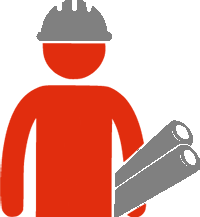Air filtration serves as an air quality solution for a full range of applications and industries. It's important because it keeps the airstream circulating and produces clean breathable air - while also preventing overexposure to bacteria, dust, VOCs, dander, and other indoor air contaminants. Improving air quality through air filtration creates a healthy work environment where employees are comfortable and production rates are higher.
While air filtration may not always be required - the General Duty Clause of the OSH Act does require that employers provide a safe work environment that doesn't have any known hazards that cause or are likely to cause death or serious injury.
Facilities where hazardous air contaminants are present should consider implementing air filtration systems if they are not already required to. Air filtration systems capture airborne contaminants to help keep the airstream, equipment, and work surfaces free and clear of debris. By implementing air filtration systems, employers can also reduce injury risks and lower maintenance costs.
Air filtration systems are made available in many different types, styles, and configurations to meet the demands of almost any application. Air filtration provides solutions for a diverse range of applications, from smoke to odors, fumes, VOCs, and more. Each system uses a blower, or fan, to draw away contaminated air through advanced filter media technology. Achieve maximum effectiveness with proper air filtration system placement. Air filtration systems are most effective when used in tandem, and must be properly placed to create a circular airflow pattern. With the right placement, you can remove airborne contaminants, prevent stale pockets of air, prevent pests, mitigate bacteria, and restrict mold.

Air filtration is critical in effectively removing contaminants like wood dust, cigar smoke, and welding fume from machining processes. Without air filtration systems, contaminated air passes breathing zones and settles onto work surfaces and machinery creating higher risks of employee injury and equipment malfunction. Consistent equipment issues result in higher maintenance and repair costs while lowering productivity rates.
Employers are responsible for workplace conditions and safety measures. Proper air filtration is key to preventing employee injury. By implementing air filtration systems, contaminants are captured before reaching breathing zones and work surfaces - reducing employee injuries and lowering maintenance costs.
There is a range of factors that impact air quality, including the application or machine processes taking place, ventilation, airflow, humidity, and temperature. Being exposed to poor air quality can result in health issues such as headaches, dizziness, and eyes, nose, and throat irritation. Long-term exposure presents higher risks of asthma, bronchitis, emphysema, nervous system effects, kidney damage, and cancer.
It's our goal to help you achieve the greatest advantage of improving the air quality in your workplace! Here are the top 3 reasons why you should:

Employers are responsible for the health and safety of machine operators.
Proper air filtration is key to preventing employee injury. By implementing air cleaning systems, contaminants are captured before reaching breathing zones and work surfaces - reducing employee injuries and lowering maintenance costs.

Better air quality = higher production rates!
When you improve the air filtration in your workplace you're lowering injury risks, reducing sick days, and minimizing the chance of equipment malfunction all resulting in higher production rates.

It's important to remember that the risk of air contamination is not limited.
When air contaminants go uncollected, dust and particulate lands on work surfaces and settles in machinery resulting in higher maintenance costs, system damage, and loss in production time.
Investing in air quality improvement not only addresses the physical well-being of employees but also shows a commitment to their overall health and comfort. Clean, fresh air in the workplace has a direct impact on morale. When employees know that their employer prioritizes a healthy work environment, it fosters a positive and supportive atmosphere, contributing to higher levels of job satisfaction.
Studies have shown that improved indoor air quality correlates with enhanced cognitive function and reduced stress levels, directly influencing employee well-being and productivity. Employees who feel that their health is valued are likely to be more engaged, resulting in increased focus, creativity, and overall job performance.
Initiatives to enhance air quality can also become part of a broader wellness program, reinforcing the organization's commitment to employee health. Regular communication about these initiatives, such as the implementation of air filtration systems or ongoing air quality assessments, serves as positive reinforcement and keeps employees informed about the steps being taken for their safety.
By prioritizing air quality improvement, your company not only complies with regulatory standards but also stands out as an organization that cares about employee well-being. This commitment can contribute to a positive corporate culture and may even become a factor in attracting and retaining talent.
If you’d like to learn more about air filtration, get in touch with one of our experts. Our team looks forward to helping you achieve the greatest advantage from improving indoor air quality.
You may also like:
• Creating a Clean Air Strategy
• Is Poor Air Quality Affecting Your Workplace?
• Top 5 Air Quality Challenges & Solutions in Industrial Settings
Call Us Today -or- Request A Quote! Request a Quote